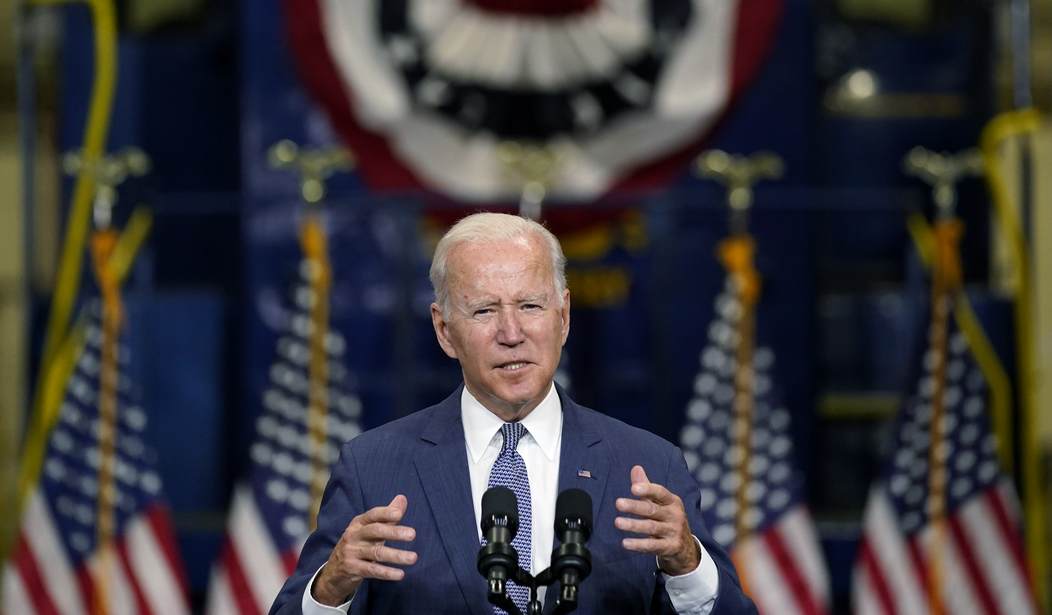President Joe Biden may have accidentally given us a glimpse into the left’s new messaging strategy. During a recent television appearance, he gave a rather odd reason for his pathetically-low approval ratings.
A CNBC poll released last Friday showed that Biden was at a dismal 41 percent approval rating. The survey also found that only 46 percent of Americans approved of his handling of the COVID-19 pandemic and only 37 percent approved of his handling of the economy.
In an appearance on the “Tonight Show” with host Jimmy Fallon, the president appeared unconcerned with his plummeting approval ratings, laughingly claiming that he stopped looking at them. Still, he did reference people’s concerns over the ongoing coronavirus issue and suggested it might be why so many Americans’ opinions on him have changed.
“Look people are afraid. People are worried. And people are getting so much inaccurate information,” he said while discussing the pandemic and the economy. “They’re being told that Armageddon is on the way.”
That third sentence is telling.
Biden is blaming his low approval ratings on “inaccurate information.” Does this sound familiar? If you’re familiar with the hard left’s ongoing efforts to censor conservative content online, this remark might sound a lot like “misinformation is tanking Biden’s popularity?”
This president has shown he has no problem pushing Big Tech to increase its censorship efforts under the guise of tamping down on supposed misinformation. His love affair with silencing dissent was seen as early as the 2020 election season. A report released in June showed that the Biden campaign tried to pressure Facebook to censor content coming from former President Donald Trump’s campaign. RedState’s Nick Arama wrote:
CNN writes about a “cache of emails” they acquired detailing communications between the Biden team and Facebook, complaining about things posted on Facebook including ‘misinformation’ from a Team Trump account.
Now, CNN spins the emails they supposedly found to put the best face on what has to be concerning communication, particularly right before the election, claiming the Biden folks were concerned about ‘misinformation.’
White House press secretary Jen Psaki in July defended the White House’s efforts to pressure Facebook and other social media companies to suppress content that went against the Democrat-approved narrative regarding the COVID-19 pandemic and the vaccines. She told reporters the Biden administration was “flagging misinformation” and asking the company to delete certain posts.
But that’s not all.
In the same month, the Biden administration and the Democratic National Committee came under fire when it was revealed it was seeking to censor certain types of text messages containing information about the coronavirus that Democrats deem to be misinformation. Politico reported:
Biden allied groups, including the Democratic National Committee, are also planning to engage fact-checkers more aggressively and work with SMS carriers to dispel misinformation about vaccines that is sent over social media and text messages. The goal is to ensure that people who may have difficulty getting a vaccination because of issues like transportation see those barriers lessened or removed entirely.
“We are steadfastly committed to keeping politics out of the effort to get every American vaccinated so that we can save lives and help our economy further recover,” White House spokesperson Kevin Munoz said. “When we see deliberate efforts to spread misinformation, we view that as an impediment to the country’s public health and will not shy away from calling that out.”
So far, the president, along with his close friends and allies in the activist media, have used the “misinformation” strategy when comes to issues related to the COVID-19 pandemic and vaccines. When someone questions the Democrat-approved narrative, Big Tech mobilizes to squash their content online. The Biden administration has been collaborating with these companies to ensure only their narratives on the vaccine prevail.
Biden’s comments seem to signal that the left might seek to expand their definition of “misinformation” in a way that benefits them politically. What happens when left-wingers proclaim that more censorship is needed because misinformation and disinformation are unfairly affected the president’s approval ratings? What if they start arguing that misinformation could potentially influence elections or the passage of important progressive legislation? Could Big Tech, in conjunction with the Democratic Party, use the misinformation excuse to ramp up their efforts suppress a wider watch of conservative views?
Of course, the president’s words may just be that: Empty words. But it is not unreasonable to think the hard left is planning more extensive ways to tamp down on right-leaning content online. When that happens, conservatives better be ready.













